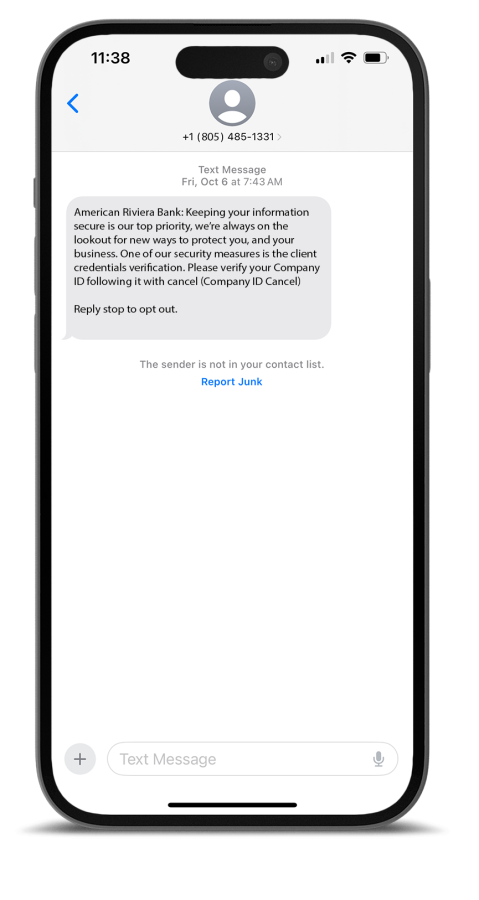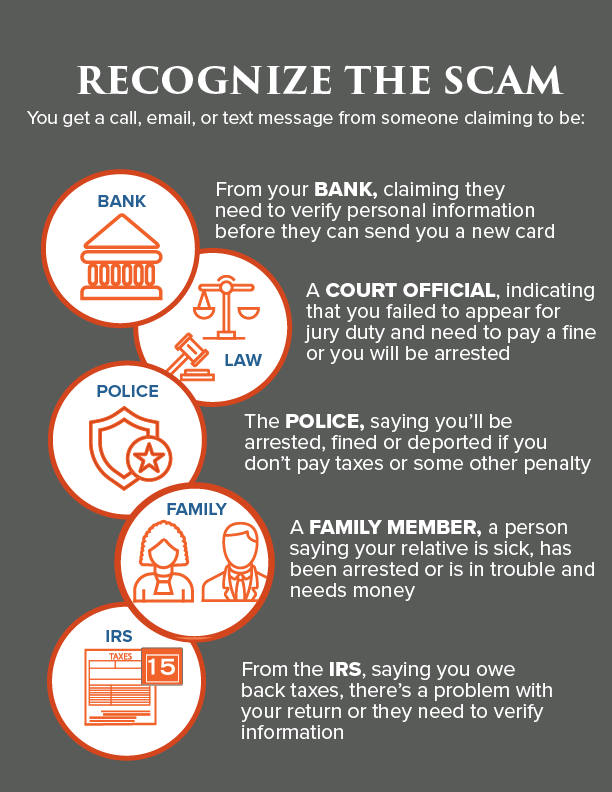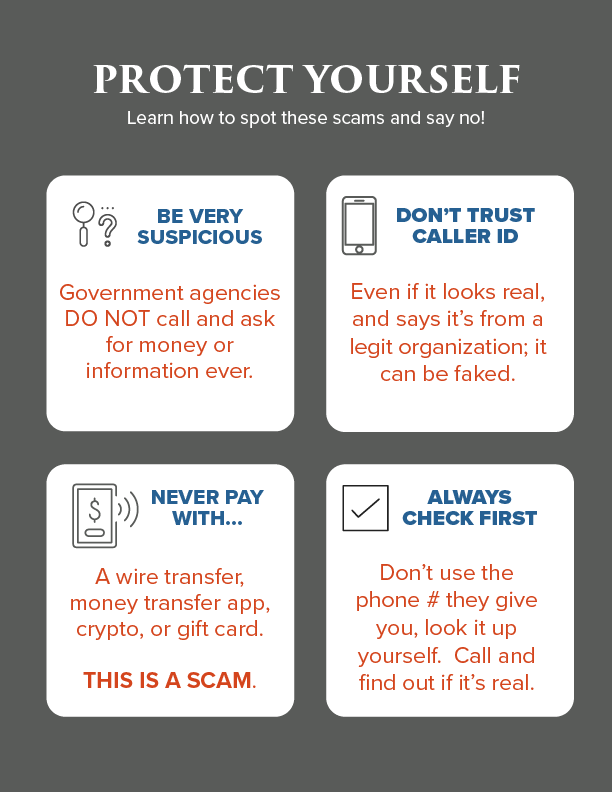

Updated July 2025
We are issuing this warning to address the increasing prevalence of scams targeting our clients and to offer guidance and support to those who may have been affected. The FTC received fraud reports from 2.6 million consumers in 2024, nearly the same amount as 2023.
The most commonly reported scam category was imposter scams, with $2.95 billion reported lost. While reported losses were down from 2023, consumers reported losing more money to scams in 2024 where they paid with bank transfers or cryptocurrency than all other payment methods combined. Losses to government imposter scams saw the biggest uptick, increasing $171 million from 2023 to a total of $789 million in 2024. Reports of bank impersonations also continue high in the rankings after rising to the FTC’s #1 most reported imposter scam in 2023.
Business and job opportunities increased as well, with reported losses totaling $750.6 million—up nearly $250 million from 2023. The other most reported categories of fraud were investment-related reports and internet services. While imposter scams comprised the highest number of reports, more money was lost to investment scams—$5.7 billion—than any other category in 2024. That amount represents a 24% increase over 2023.
We are receiving increasing reports of bank impersonation scams, where fraudsters are impersonating the Bank’s “Fraud Department” and tricking victims into providing their online banking credentials.

The landscape of scams is continuously evolving, particularly with the growing reliance on the internet. The FBI has raised concerns about a surge in "phantom hacker" scams. Imposter scams, where fraudsters pose as bank employees, acquaintances, government agencies, or even the FBI, are experiencing a significant rise.
In 2024, business imposters, those who deceitfully claim affiliation with reputable retailers, utility companies, or financial institutions, caused victims to suffer losses totaling $752 million. The communications sent by these scammers appear legitimate, featuring convincing logos, emails, and website links. Additionally, when engaging in phone calls, the individuals on the other end often exude professionalism and authority.
"Phantom hacker" scams often begin with a call from “tech support,” urging individuals to click on a link to download software in order to grant remote access for system inspection. They may even request permission for the program to run overnight, during which they scan computers to extract financial information. This may involve searching through emails for tax returns or saved passwords. In some instances, they may request access to online banking and the one-time password sent to your cell phone. Subsequently, they exploit this access to execute external transfers, bill payments, or Zelle® payments from your account. They might even transfer funds between your accounts to create the illusion of an accidental large sum deposit that requires repayment.
Please be aware that you might receive phone calls from individuals who claim to be from the Federal Trade Commission, government officials, the FBI, or other law enforcement agencies. Lately, these calls have been made to seem like they are coming from law enforcement. The callers may use scare tactics by alleging your involvement in criminal activities such as child pornography or illegal dealings with foreign countries like China. The fraudster might then transfer the call to someone claiming to be a bank representative and instruct you to transfer funds for safekeeping while an investigation is conducted. They may also advise against contacting your regular banker, claiming that they are involved in the investigation. They typically warn against sharing any information, saying it's part of a confidential criminal investigation.
Any time an individual alleges fraudulent or criminal activity on your accounts and advises transferring funds from your bank, investment, or retirement accounts to "protect" them, you can rest assured it is a scam; end the correspondence immediately and notify the authorities.
How can you tell it's a scam? If the caller says you need to buy gift cards, go to a cryptocurrency ATM, or go to the bank in person while they stay on the phone with you, that's a scammer. And if the caller tells you to lie to anyone who asks why you're transferring or withdrawing so much money, that's also a clear sign of a scam. The FTC also has a blog series on The Anatomy of an Imposter Scam.
Here's what else to know and do about these scams:

Scammers may utilize caller ID to make it appear as if they are calling from your bank, Amazon, a tech support company, or an official government number.
Text or email: Scammers may initially contact you via text or email and then proceed to follow up with a phone call from "the fraud department."
Here are some common phrases and tactics they might use:
Scams can typically be ignored with no action. However, here are some suggested actions if you receive a text message or phone call.
Don’t respond to an unsolicited text message!
Enable two-step verification for all of your accounts and never share a code delivered to your device for verification purposes.
Don't click in a text or email—visit us directly at ARB.bank!
Verify the number call is legitimate before answering!
Don't feel pressured
Don't send money or provide personal information based on contact via phone or email.

Time is of the essence when you're trying to recover funds. Report any suspicious activity immediately to your bank. You can also report to IC3.gov and the Federal Trade Commission.
IC3.gov: The FBI requests victims report these fraudulent or suspicious activities to their local FBI field office and the FBI IC3 at www.ic3.gov. Be sure to include as much information as possible.
You can report scams to the FTC by going to ReportFraud.ftc.gov. It's important to report scams to the Federal Trade Commission. By doing so, you're not only helping yourself but also preventing future fraudulent activities. The FTC also has a resource page that includes steps to take if you have lost money or personal data to a scam.
For additional information on similar scams, please see previous Public Service Announcements published on the FBI IC3 website.
Don't click in a text or email—visit us directly at ARB.bank!
Previous: New Home Buying Grant 2024 Next: Protecting Older Americans from Fraud